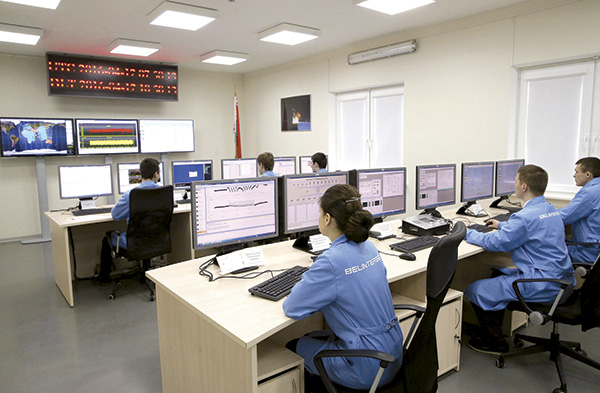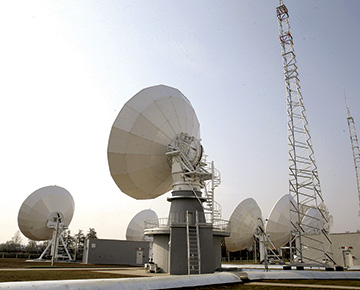
“We started out by providing satellite design services to other countries. Now, we can create satellites using manufacturing co-operation schemes. We can have our satellites inserted into orbit (with someone’s help) and don’t need space launch centers for that. We control the satellite, collect data and sell it. Everything is in our hands,” notes the President.
The Head of State heard about the project to create the national satellite communication and broadcasting system, which is being implemented in line with a contract between Belarusian enterprise Precision Electromechanics and China’s Great Wall Industry Corporation. The Belarusian telecommunication satellite Belintersat-1 was successfully launched into orbit in January 2016 using a Chinese space launch centre.
The Chairman of the State Military-Industrial Committee of Belarus, Sergey Gurulev, notes that we must commercialise satellite services, focusing on profitability. Apart from selling communication services to foreign partners, we can target the home market, including the army and other security agencies. The aim is a brand new stage for communication technologies in Belarus. With Belintersat-1 in orbit, Belarus is on the prestigious list of just over 30 countries boasting a communication satellite.
According to Mr. Gurulev, the best scenario would be to have three satellites in geostationary orbit, to cover virtually the entire surface of the Earth. “If we need it and it’s profitable, then it’s a matter of national importance. We’re setting out with profit in mind,” notes Mr. Lukashenko, underlining that selling the end product to target markets is vital, as in other branches.
“If these endeavours go well, we’ll launch a second satellite, for the sake of more reliable communication,” says the President. “The facility has many functions and our country needs them, so we’ll develop them. I’m very glad that we’re making such jobs available to young Belarusians. We’ll pay close attention to this issue.”
Belarus is now the 36th country in the world to have its own communication satellite, of almost 200 independent states, i.e., only about one fifth of the world’s states now have a ‘club card’ and not all of these ‘cards’ are of equal ranking.
From the point of view of business, the near-Earth topic is very interesting. The creation of a national satellite communication and broadcasting system is costing just over $295m, with almost $281m provided via a Chinese loan on preferential terms. Chinese partners launched our Belintersat-1 satellite this January, and signed a lease worth $52.2m (20 percent of the cost), with almost $42m already given to Precision Electromechanics. Belarus only needs around 10 percent of the satellite’s capacity, while the remainder is for sale or lease. The satellite should last at least 15 years, allowing for the project to easily pay for itself. Countries in Europe, Africa and Asia are showing interest, with negotiations underway.
Belarus’ joining of the space club brings not only closer integration into the global information space but stronger information security and defence capacity, as well as stimulating allied industries. We’re moving from production of space technology components to the provision of orbital services. Stankovo is now a centre for space observations, offering employment prospects to our talented young people.

At the ground-based control complex of the national satellite communication and broadcasting system
Talking to personnel at the ground-based control complex of the national satellite communication and broadcasting system, the Head of State emphasised his goal of developing the space industry in Belarus. In former times, some opposed the idea as unnecessary but time has proven the wisdom of his support. He underlines, “We set out to explore these possibilities, for the sake of the nation’s development. We’ve learnt how to plough soil, sow and gather crops. We’ve also learnt how to make sophisticated industrial products. However, these accomplishments have nothing to do with future progress, unlike the space industry, the nuclear power plant, and the High-Tech Park.”
The President remarks that many other industries have focused on the development of cutting-edge technologies, including in the sphere of healthcare, where increasingly high-tech surgeries are being mastered. The education sphere is also adapting to today’s requirements. “We made this decision for the sake of the nation’s future, so that it might remain at the forefront of development,” says the Head of State.
Going back to space industry issues, Mr. Lukashenko remarks that the space industry has brought about the rise of other enterprises, explaining, “The launch of the satellite and the construction of the flight control centre have provided jobs to many enterprises and to thousands of people. The development of accompanying industries has been my primary concern.”
Core specialists at the ground-based control complex of the national satellite communication and broadcasting system are young people aged between 25 and 30, who have undergone additional training in China after receiving their diplomas.
Mr. Lukashenko chatted with staff at the centre during his tour, and promised that the government will continue focusing on social issues, including youth employment and first job assignment for university graduates. He emphasised, “When we made the decision to increase the retirement age, we were perfectly aware that this would require additional jobs. This is why, this year, we’ve decided to create more than 50,000 jobs. We’ll demand this from executives, in every possible way and regardless of market principles, promoting conditions for private businesses to create employment.”
Belarus continues to highlight security issues, with the Belarusian leader noting, “The security of our people, and our society, is a priority for me, as is the defence capability of the country.” Belarusian defence enterprises are manufacturing necessary and ‘in-demand’ defence systems and missile complexes for Belarus, as the President notes. During his tour, he commented, “Don’t worry about the future, or the security or defence capability of our country. We have enough specialists to create efficient defence systems to counteract any rival. We’ll always protect our land. We won’t give away what belongs to us and won’t pursue others’ possessions.”
Mr. Lukashenko heard about housing and amenities available to personnel, and visited the multiple-occupancy building near the centre, which offers comfortable living conditions..
By Vladimir Velikhov











